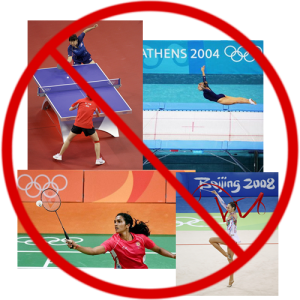Tag: history
WHICH EVENTS SHOULD BE ELIMINATED FROM THE OLYMPICS – Summer Edition – UPDATED Tokyo 2020
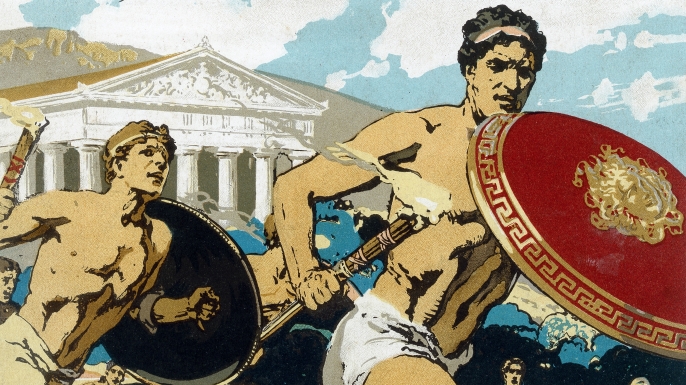
**UPDATED for the 2020 (2021) TOKYO Olympics**
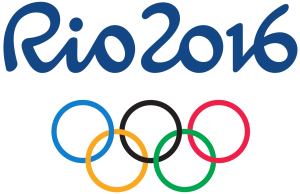 As the 2016 Summer Olympics in Rio come to an end in the next few days, I sit here bemused at my seemingly neverending interest, borderline obsession, in watching them and absorbing the energy surrounding the games. The Olympics, both summer and winter but mostly summer, have fascinated me ever since I can remember. I’m not sure why or who may have influenced it, because nobody in my family has the same infatuation. I think part of it is because I was such an athlete in my youth and even into college years. I played everything from soccer to football, rugby to basketball, rowed crew, and even track and field where I ran the 200m, 400m, 300m hurdles, 4x400m, long jump, triple jump, occasionally the 800m. Another aspect is my love of history, and the Olympics is an international competitive festival of sorts that is inspired by a similar historical occurrence from ancient times. In the back of my mind I always had (and still have) my very own “Olympic Dream”. The closest I got was when I was a rower for the University of Miami varsity Men’s 8 crew team and was being scouted for the US national team. I chose not to pursue things further back then, and although I do not regret the decision, I can’t help but think, “What if?”
As the 2016 Summer Olympics in Rio come to an end in the next few days, I sit here bemused at my seemingly neverending interest, borderline obsession, in watching them and absorbing the energy surrounding the games. The Olympics, both summer and winter but mostly summer, have fascinated me ever since I can remember. I’m not sure why or who may have influenced it, because nobody in my family has the same infatuation. I think part of it is because I was such an athlete in my youth and even into college years. I played everything from soccer to football, rugby to basketball, rowed crew, and even track and field where I ran the 200m, 400m, 300m hurdles, 4x400m, long jump, triple jump, occasionally the 800m. Another aspect is my love of history, and the Olympics is an international competitive festival of sorts that is inspired by a similar historical occurrence from ancient times. In the back of my mind I always had (and still have) my very own “Olympic Dream”. The closest I got was when I was a rower for the University of Miami varsity Men’s 8 crew team and was being scouted for the US national team. I chose not to pursue things further back then, and although I do not regret the decision, I can’t help but think, “What if?”
 Every four years I huddle around the television, glued to the stories of triumph and tragedy. Well, if you factor in the winter Olympics, it’s every two years now, but for the purposes of this post, I’m focusing on the summer Olympics. I leave inspired by the achievements of these great athletes and wonder if I could have had the level of commitment it would take to reach the elite levels of athletic competitiveness in any sport. I love watching the stories of how these phenoms developed and worked to get where they are, with some of those stories ending in victory, some not so much.
Every four years I huddle around the television, glued to the stories of triumph and tragedy. Well, if you factor in the winter Olympics, it’s every two years now, but for the purposes of this post, I’m focusing on the summer Olympics. I leave inspired by the achievements of these great athletes and wonder if I could have had the level of commitment it would take to reach the elite levels of athletic competitiveness in any sport. I love watching the stories of how these phenoms developed and worked to get where they are, with some of those stories ending in victory, some not so much.

Simone Biles’ story comes to mind. Her level of gymnastic perfection is unparalleled and a mere five years ago she was not even on the radar. Kerri Walsh’s beach volleyball dominance is another. Usain Bolt’s sprinting supremacy is mind blowing. And of course one cannot discuss the Olympics and not mention the ultimate reign of Michael Phelps and his medal horde, a feat that will most likely never be matched.
And then they run a promo for upcoming events and they mention table tennis, badminton, trampoline, and shooting events. I always do a double take when that happens because the athlete inside of me cannot believe that these are “Olympic” events. I don’t mean to demean their qualifications as legitimate sports, but one cannot help but wonder where the Olympic organization will draw the line. In my opinion, there are just too many Olympic events and the breadth of events has gotten out of control.
Olympic History
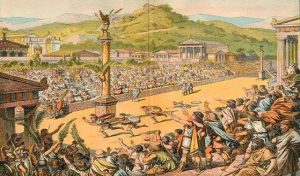 Let’s take a look at this in further detail. The ancient Olympic games first began as one foot race on one day… basically back and forth once through the stadium. The race was called “stadion”, the word that eventually became “stadium” where we hold these athletic contests. Eventually the games expanded for five days of events with everything from racing to boxing, wrestling, discus, javelin, chariot races, jumping, running with armor and shields (can we bring this back please?!) and a few other basic athletic events, not a ping or a pong among them.
Let’s take a look at this in further detail. The ancient Olympic games first began as one foot race on one day… basically back and forth once through the stadium. The race was called “stadion”, the word that eventually became “stadium” where we hold these athletic contests. Eventually the games expanded for five days of events with everything from racing to boxing, wrestling, discus, javelin, chariot races, jumping, running with armor and shields (can we bring this back please?!) and a few other basic athletic events, not a ping or a pong among them.
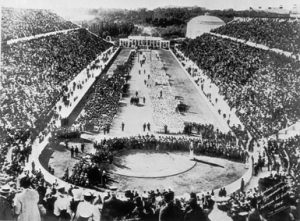
When they renewed the games in 1896, they began with a humble collection of sports, not too dissimilar from the original events, and of course sprinkled with the then “modern” sporting events. The events in the renewed games in Athens covered sports in track-and-field, swimming, gymnastics, cycling, wrestling, weightlifting, fencing, shooting, and tennis. As the games progressed and gained international support, notoriety, and acclaim, more and more events were added. Which brings us to the obnoxious maelstrom of “sporting” events we have today.
I will make a side note that from 1912 to 1948 they included “artistic competition” events that included many artistic pursuits including painting, architecture, music, and more. This was eventually removed due to the logistics in organizing it and it’s non-adherence to many of the Olympic principals and distracting focus from the games as an athletic competition festival. From 1952 onwards, there has been an art festival in the host city of the games to run concurrently as a compromise to losing the art competition portion of the games they wanted to include. The art festival was and is a great idea in my opinion. And I also think several of the Olympic “sporting events” should be held as artistic exhibition performances in the art festival instead of competitive events.
Olympic Event Elimination
 While it’s understandable and expected for the Olympic event expansion to grow along with the logistic, financial, and societal capabilities and expectations, there seems to be no end in sight to what they will include. I soon expect Underwater Basket Weaving to become an Olympic event in the near future. Do we really need golf, table tennis, badminton, and trampoline as Olympic events? My interpretation of the Olympics is that it is a festival of athletic competitive events that test the physical athleticism in particular sporting disciplines that test the limits of the human body. Now don’t get me wrong, I’m not downplaying the validity of these other sports, but I do think the Olympics has way too many events and should have some sort of limit or discretion when choosing events.
While it’s understandable and expected for the Olympic event expansion to grow along with the logistic, financial, and societal capabilities and expectations, there seems to be no end in sight to what they will include. I soon expect Underwater Basket Weaving to become an Olympic event in the near future. Do we really need golf, table tennis, badminton, and trampoline as Olympic events? My interpretation of the Olympics is that it is a festival of athletic competitive events that test the physical athleticism in particular sporting disciplines that test the limits of the human body. Now don’t get me wrong, I’m not downplaying the validity of these other sports, but I do think the Olympics has way too many events and should have some sort of limit or discretion when choosing events.
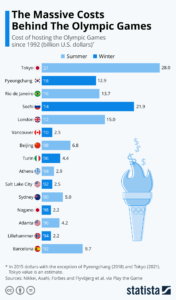
 2020 Tokyo Olympics (2021) UPDATE:
2020 Tokyo Olympics (2021) UPDATE:
In addition to the aforementioned, for the last several years there have been discussions about the Olympics costing the host cities too much, with a diminishing return compared to previous eras. So much so that the IOC is having trouble finding cities that even want to bid on becoming host.
Aside from the IOC’s greed when it comes to broadcasting rights, which could warrant its own post, there are so many sports and events included now that the logistics of having to plan and build out all the venues has gotten astronomical. Even just BIDDING on becoming a host city cost many millions and every Olympics in recent history has gone billions and billions over budget, with particular egregious cost overruns in the past ten years. There is no need to burden the purity of the games with so many venues, sports and logistics for events that don’t quite fit the bill of that enduring Olympic motto: Faster. Higher. Stronger.
With all this in mind, I’ve selected events that I think should be removed from the games, as well as events that I think are on the line and could be removed, but also could remain.
Suggested Olympic Events to be Removed:
- Table Tennis – Come on, it’s a trivial leisure game. Yes, it requires a specific skill, hand-eye coordination, and at the higher levels, physicality can be a component, but it’s just silly to have it in there.
- Trampoline – Don’t think I need to explain this one. Ridiculous that it’s in there.
- Badminton – Again, a leisure game to be played at beaches and backyards, certainly not an Olympic event!
- Race Walking – I think hands down, this is the lamest “event” currently in the Olympics. It’s like having a contest to see who can whisper the loudest. Superbly idiotic for this to even be a competitive “sport”. Just go for a walk if you want to walk. If you want to compete for time and speed, then RUN Forrest RUN!
- Synchronized Anything – swimming, diving, etc. – Although I think synchronized swimming is a beautiful art form that does indeed require quite a bit of physical capability and stamina, it shouldn’t be a competitive sport in the summer Olympics. If you’re going to have this event, then why not Ballroom Dancing? It’s the same idea. Neither should be in there because they are more of an artistic endeavor rather than an athletic competitive event. Yes, gymnastics overlaps this idea a bit, but overall, the athletics involved with gymnastics as well as its history can allow for a little bit of the artistry to slip in there. Synchronized diving, although quite athletic, is just superfluous and unnecessary. There’s already a ton of diving events, no need for this at all.
- Rhythmic Gymnastics – as previously mentioned, it’s just too artistic and seems like an unnecessary extra facet of gymnastics to include when the regular gymnastics is comprehensive enough to satiate the gymnastics discipline.
- All shooting events – Ok, so this one will be controversial, but hear me out. Although there have been shooting events since the 1896 games, I think it should be taken out. It’s more of a specific skill rather than a competitive athletic endeavor. Aside from that, there’s the moral implications of exalting someone for being skilled with a device intended for killing. I think society has progressed past this and the Olympics should reflect that morality. Taking out all gun related events would make a statement and also put more focus back on the athletics.
- All horse/equestrian events – again, this might seem extreme to some, but I have my justifications. Yes, the original ancient games had chariot races so horses were used (and I’m sure they were abused, injured, and killed along the way as well). But this is not a good reason to continue the equestrian portion of the games. I honestly enjoy watching those beautiful beasts jumping and trotting around, but isn’t the animal doing most of the work? How does this test the human athleticism? Just doesn’t seem to fit with everything else. And when you factor in the abuse and exploitation of the horses, again, I think we have collectively evolved past this and don’t need to include this in the games that represent the collective human competitive spirit.
2020 Tokyo Olympics (in 2021) UPDATE:
- 3×3 Basketball – As a huge fan of basketball, I’m glad basketball is in the games, but why add this 3 on 3 version? Just totally unnecessary and adds additional burden for the host city to come up with yet another venue in an already absurdly bloated Olympics.
- “Artistic” Swimming – aka Synchronized swimming – see above. But just to reiterate, if it’s artistic, then leave it to another competition or tournament or whatever. Just to echo my thoughts about rhythmic gymnastics from 2016 – they are just too off the core path of what the Olympics were meant to be. Not to deny the inherent athleticism involved in these events, but they are more performance based in nature and do not need to be involved in the Olympics. Nice to watch, but not as an Olympic event…Vegas maybe?
- BMX Freestyle & Skateboarding – First, let me acknowledge that I think those disciplines are cool as hell and hats off to anyone brave and skilled enough to attempt them much less excel at them at an international level. BUT, Olympic sports they are not. There is artistry involved as well as an athletic component, but they don’t fit the mold of an Olympic event. Faster. Higher. Stronger.? Nah, just feels like they’re trying to force an edgier sport in there to somehow connect to a younger audience. When in reality they are diluting the Olympic experience by including any physical activity that involves getting off the couch. These have their niche in the extreme sports world, no need to bring them into this jam packed Olympics with even more expenses for the host cities.
- Kata – Look, I LOVE martial arts, I took karate for 10 years as a kid, krav maga as an adult, and current still do kickboxing fitness classes. And I think Kata is beautiful to watch. But Olympic event? Come on. This is getting out of hand! Where will they draw the line? Might as well have solo modern dance in there as well as solo painting. One can argue that the floor routine for gymnastics is a solo art form, so why not kata? I understand that, but let’s be honest here…kata is a very, very specialized art form whereas gymnastics is ubiquitous throughout almost every corner of the planet. And the IOC has to limit the scope of the sports somewhere. NOTE: Kata and I think Karate in general is supposed to be just a specific event for Tokyo 2020 Olympics. I’d be open to Karate being made permanent, but def not Kata.
On The Fence:
- Sailing – This discipline (there are multiple sailing events), although interesting and requiring both a specific skill as well as some physicality, just doesn’t seem like it fits in the whole realm of “athletic competition”. That being said, there’s something about the history of sailing and man’s capability to circumnavigate the globe via sailing, thus bringing us all together which kind of flows with the historical spirit of the games. But if it was up to me, I’d cut it, but I do see strengths in keeping it too.
- Cycling – Not all cycling events, however. I think the road and track cycling events are OK, but anything else just seems unnecessary and superfluous – BMX, Mountain Biking, etc., just don’t need it. Again, if it was up to me, I’d cut all cycling out altogether and just keep it in the Triathlon, but I do see some positive points to keeping the road and track events in there.
- Golf – I’m just not a big fan of this sport, and while it is technically a sport, I log it in as maybe one notch over badminton. Not really something super athletically competitive, although it admittedly has an athletic component. It’s kind of just a leisure sport that requires specific skills that aren’t particularly athletic. It’s on the fence for me only because it is so widely played throughout the world, so perhaps there’s something to be said about universal appeal. But once again, if it’s up to me, cut it, totally excessive.
2020 Tokyo Olympics (in 2021) UPDATE:
- As a former rower myself, I love those events, but do we really also need Kayaking AND Canoeing too? Just seems overkill. Pick one or the other. If it was up to me, lose canoeing. Keep kayaking and rowing. But I’m still on the fence about it, I see the value in having them all in there and since the venues already exist what’s the harm in throwing a few more different boat configurations down the courses, right? But if one were to cut the fat and trim the games down then I’d probably lose one.
Sports I’d Like to See Added:
- Surfing – Not only super athletic and challenging, but it adds a modern sport in there that gives the games an updated relevance while adhering to the spirit of the games. I can see the point of view regarding the judged aspect of it, but think of it like gymnastics in the water while on a board. Cool, interesting, and definitely athletic.
- Baseball/Softball – This is a team sport that is enjoyed by hundreds of millions. I think they may of cut it out because there’s only a handful of countries that are even capable of fielding a team – US, Japan, Cuba, Puerto Rico, Canada, Mexico, S. Korea – maybe a few more I’m probably missing, but certainly not a huge pool of internationally competitive teams. So I understand the reasoning behind removing it, but I’d still like to see it.
- Pankration (or Mixed Martial Arts) – Pankration was an original Ancient Olympics event and I think with not only the popularity of MMA, but the historical relevancy, plus the obvious clear athletic competitiveness, I think it would be a great addition to the games.
2020 Tokyo (2021) UPDATE: Surfing, Baseball, Softball added!!! And they added Sport Climbing, which I didn’t mention before and wish I had. So glad it was included, as it adds an amazing human vs nature ultimate athleticism aspect to the games. Overall I’m excited about these new (and returning) Olympic sports. With all the different martial arts disciplines in these Olympics, it would still be cool to see one of the original ancient Olympic forms in there as Pankration.
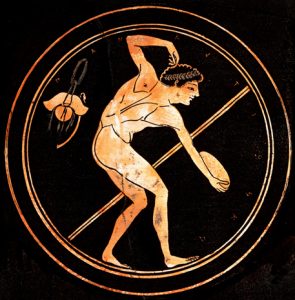
Final Thoughts
As an overall note, I think for the sporting disciplines that I haven’t mentioned at all that are great in the games, there could be some reduction in the number of events. Sometimes it seems like there’s so many distances and team/individual versions of some of the disciplines, it’s just so puffed up that the focus get’s blurry. Let’s keep things honed, lean, and super focused on the athletic competition of it all and in the spirit of the
Olympic motto: “Faster, Higher, Stronger”
A Genealogical Quest for Identity – PART 2 of 2
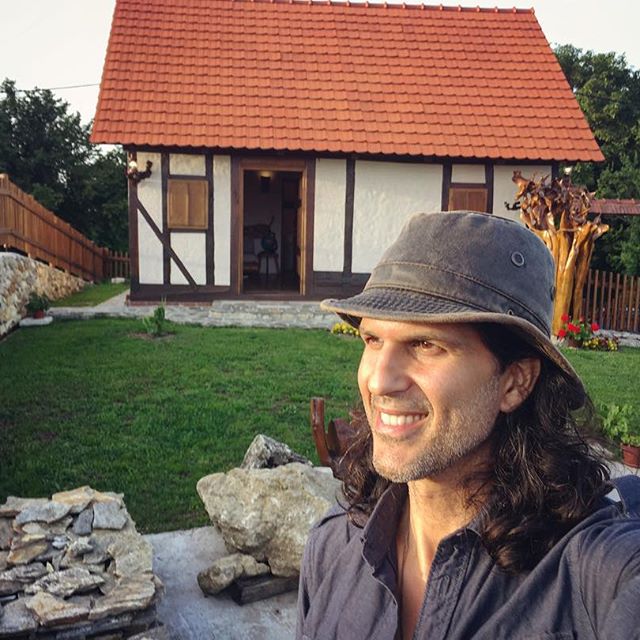
NOTE: If you haven’t read PART 1, you can read it here
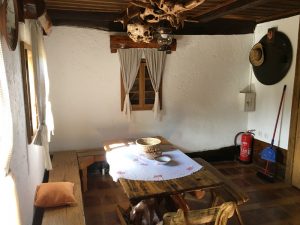
As I hinted at in my PART 1 of this post, I was hopeful that the latter half of this segment of my quest would deliver more fruit in terms of my family history and genealogy research. The trials and tribulations of mining through the nebulous records of a foreign country with only basic understanding of the language have proven difficult, but not as much as the clerical and logistical roller coaster. The amount of hoops one must jump through in order to find a morsel of information is frustrating to say the least.
That being said, it’s still pretty amazing to think that they have records in books from hundreds of years ago that were kept intact throughout the Napoleonic, Venetian, Austro-Hungarian, Ottoman, and Communist rule and occupations. In a land that has been split up, torn apart and put back together again many times in the past several hundred years, it’s a wonderment that one can find any records whatsoever. But alas, here we are in 2016, and I’m about to walk into one of the satellite records Archives offices in Varaždin.
What I quickly learned on my journey is that there are several satellite archive offices scattered around different regions of Croatia which hold archival records from each respective region (roughly pre-1900). Those records go back approximately 50 or 100 years. Anything older than that is stored in the main archives in Zagreb. Incidentally, that’s where my journey started, and might be where it ends too… we shall see.
The Quest Continues
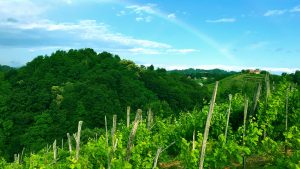
I woke up in the morning at my Croatian countryside cabin nestled in the vineyard and noticed a drizzle from the sky and one of the most stunning rainbows I’d ever seen, encircling the breadth of the landscape, a multicolor streak serving as a welcome banner to the region of my ancestors. If I was looking for a sign from the universe that I was on the right track, this would most assuredly be it!
Leaving the country vineyard cabin behind was tough, but I had to stay steadfast on my mission, to the archives or bust! I pulled into the parking lot next to an old building with a Croatian flag, the consistent symbol adorning the plethora of government offices I’d been to over the past several years.
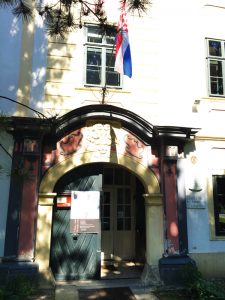
The Archives in Varaždin
After managing to find a few people that spoke a little bit of English, one of them quite well, I was able to communicate what I wanted to the gentleman and take a sigh of relief because I was off the hook as far as language barrier, thank goodness. They explained to me that there were several possible stashes of archival books where I might be able to find information from my family. From the long list they picked out, I had a strong sense that I would never get all that done in one day and unfortunately it was a Friday and I was leaving for the coast later that evening. No matter… I would plow through as much as I could and see what I could find.
They took me up to a second level into a room with a really large wooden table with shelves of old books… was this the Croatian Hogwart’s library? I was given a pair of white gloves to put on so the oils from my hands wouldn’t damage the old, weathered pages. We discussed which book to bring out first and decided on the books from the Zagorje region. He left to get them from the library stash while I took obligatory selfies.
Accompanying him upon his return was an old, large leather-bound book with parchment pages. Definitely the most epic book I’d ever touched! He showed me the columns of information, what they meant, and how to look for the information relating to my family. It was like searching for a needle in a haystack… handwritten Croatian script writing of names, dates, and places, a sea of words and letters within which I’d have to recognize the names from my family tree.
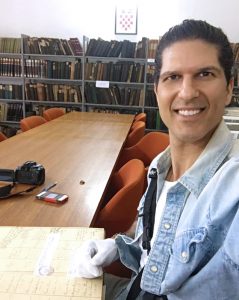
Searching Through the History Books
I began to carefully turn the pages, scanning all the columns, one by one. It was quite cumbersome, yet intriguing, satiating a curiosity for knowledge and history. And then something really interesting happened… I started noticing patterns in the entries. I began to recognize other family names and their relations and their matching addresses. I was able to pull out little stories from the sea of writing. Turns out back then a lot of families lived on the same land, so there were addresses with several lines of a family listed as having been born there.
For example, there were two back-to-back birth entries, both boys born on the same day at the same address but different parents. Then I noticed the fathers had the same last name, and the sons had the same names as the other one’s father. So, what I deduced was two brothers that lived at the same address had their sons on the same day and they named their sons after one another. How endearing is that? Proof of the strength of family bonds in this region and the anchor that knowledge of one’s family ties has in this culture. There were several other really cool stories I pulled out while scanning the books, but that was the most charming to me.
Every 10 or 15 minutes I’d find an entry that I thought was related to me, but then we’d dig through the papers to verify and it would be disproven. As time ticked away, new books would be brought out, birth records, death records, marriage records, all from the various regions I requested. I painstakingly sifted through every page for clues, sometimes twice just in case, like a genealogical sleuth searching for the truth. The other workers mentioned that they were going to get a coffee and a bite to eat and they invited me to go along. I thanked them, but insisted that I stay, despite the fact that I hadn’t eaten, drank or visited the bathroom since 8 AM and it was now pushing 2 PM. They were impressed with my commitment and resolution, but I was committed to finding a shred of SOMETHING from my family history before their closing time at 4 PM. One of the kind gentleman agreed to stay with me and help search, he too knew I would never get through even half the books on my own, with his help, we could get maybe 75% of it done.
About 30 minutes later, we found something… an entry that seemed to match my grandfather’s mother. We didn’t know much about her or her parents, not even their names, so this would be a big find. Sure enough, we verified it, it was indeed her! A big sigh of relief as the time was coming to an end. With a fifth wind kicking in, fueled by this awesome find, I kept sifting through the books as fast as I could for as long as they’d allow me to stay there. And just before they were about to shut me down…bam! I found another entry… the name of my grandmother’s father, address matched, seemed to be the one… woohoo!!! (Note: later I was to find out that the second family record I found might not be correct, although the verification of that is still ongoing).
With a sense of success and achievement, we scurried down the stairs with the books in hand and over to the first guy I spoke to who had to verify everything and punch it into a program to generate a certificate for me to take home as proof of the family line. And just like that, the family tree was extended another generation back and I had the information I needed to dig around the archives in Zagreb. There are still more books to go through and more family lines to trace, so the search in Varaždin is not complete, I indeed shall return to those old books one day.
The Result: A Few Steps Closer to Identity
Before I left, I profusely thanked all of the workers that assisted me, especially the guy that helped me look through the books. He also gave me the names of the parishes in the regions I was searching so I could contact the priests and see if they have any additional information to offer. Apparently the churches in each region used to keep most of the records and that is how a lot of these books survived all the wars and flip flopping back and forth. Very cool, another trail to explore!
Although my journey is not finished, there was a big sense of relief leaving there with new information. My efforts had not been in vain and I was getting results. Finding one key opened another mystery that must be solved… I felt like I was on a scavenger hunt or in a Sherlock Holmes novel that revolved around my family tree. With each step back to my car, I could feel a stronger sense of who I was with pride knowing that I came from such a deep history and that I’d played an important part in uncovering some of it.
The following evening when I was in Dubrovnik, I had dinner with some friends who lived there. One was a local from Dubrovnik and we were talking about my quest when she kind of giggled. I asked her what was so funny about it and she said my story was so interesting to her because she never really thinks about her ancestors. “If I want to know anything, I would just go over that hill to the cemetery and find out everything I want to know. I just know they’re there, so I don’t worry too much about it”. When she said that, I knew why I had a burning inside to know who my ancestors were, and that was good enough for me to fuel the remaining quests.
In the future I intend to return to Zagreb and dig through those archives. I also intend to go back to Varaždin and see what else I can find. Once all is said and done and I’ve traced the line as far as I can, I plan to switch over to my paternal side and see what traces I can find in India, which will undoubtedly warrant it’s own posts when the time comes.
Perhaps this post will have a part 3 or 4, I’m not sure where the journey will go, and to me, that’s one of the most exciting aspects of this whole genealogical quest.
A Genealogical Quest for Identity – PART 1 of 2
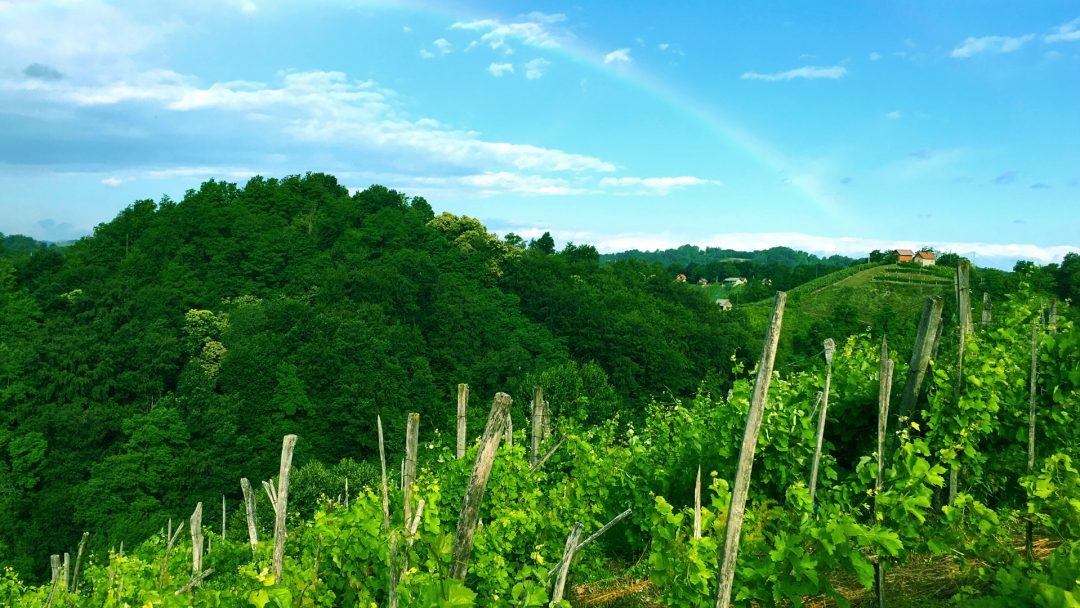
NOTE: My First Blog Post
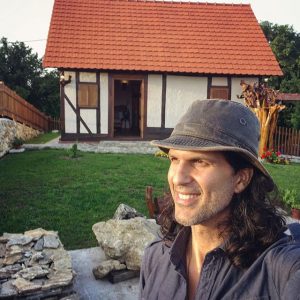 Nestled amidst symmetrical rows of grapevines on a small vineyard on one of the many rolling rural hills of the Zagorje region of Croatia, I’m writing my first blog post. I’ve been wanting to start a blog for awhile now, as a means by which to express ideas, commentary and exposition on topics that not only interest me, but also to spark intellectual discussions, enrich the reader with newfound information, or simply share stories that I feel are compelling and inspiring. With this first entry of what I hope will be many, I want to share the journey I’ve been on for years, but particularly this most recent trip to Croatia.
Nestled amidst symmetrical rows of grapevines on a small vineyard on one of the many rolling rural hills of the Zagorje region of Croatia, I’m writing my first blog post. I’ve been wanting to start a blog for awhile now, as a means by which to express ideas, commentary and exposition on topics that not only interest me, but also to spark intellectual discussions, enrich the reader with newfound information, or simply share stories that I feel are compelling and inspiring. With this first entry of what I hope will be many, I want to share the journey I’ve been on for years, but particularly this most recent trip to Croatia.
The Quest
I’m currently on a quest to see how far back I can trace my familial maternal line of Croatian heritage. Delving into one’s genealogical history can reveal insights into one’s origins, ultimately and ideally revealing more about you as a person. Having a sense of identity can ground you in place, time, and history and offer perspective about the journey of humanity and the purpose of life. It sounds obscure and grandiose, but stick with me here, it gets even more fun.
Genealogy Research
Tracing a family history via genealogy research in a country like Croatia that has been war torn for centuries, flip-flopping invaders since the Middle Ages, can be extremely challenging and cumbersome. Just when you think there’s light at the end of the tunnel, you hit a roadblock that can discourage and derail the journey. Vex not oh weary traveler, for what you seek may lie just over the next hill of red tape. The rules and regulations of a country still in transition towards the technological conveniences of modern record keeping are perplexing and mind bending. From my experience, it’s best to just accept them and take what you can get, go with the flow, and when all else fails, charm their socks off with your foreign swagger.
Although I grew up with a strong connection to my Croatian heritage, I did not pick up certain specific cultural attributes, namely the language, but also other inherent cultural idiosyncrasies that are important when planning an immersive experience. How am I going to get through this? What if they don’t speak any English? What if this was a total waste of time and energy? What if…. What if…. What if…. You can drive yourself bonkers with fear driven “What If’s…”, but the bottom line is that you just have to grow a pair, suck it up and get in that car, plane, boat, hovercraft, and go for it, if the interest compels you.
The First Stop – The Office of Birth and Death Records in Lepoglava
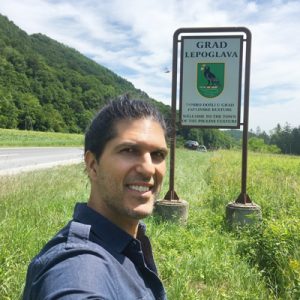 Today I was a little bit nervous approaching the records office in Lepoglava where my grandfather was born and raised (and also happens to be where Croatia’s main prison is located, offering a creepy and terrifying backdrop to the situation). I fumbled through a rickety door into the mostly dull 1960s communist era office and managed to ask (in Croatian) the innocuous elderly lady seated at the desk if she speaks English. She replied with an adamant “Ne” (or “no”), prompting me to break out into a nervous sweat with dry mouth setting in, “oh crap, what do I do now?”
Today I was a little bit nervous approaching the records office in Lepoglava where my grandfather was born and raised (and also happens to be where Croatia’s main prison is located, offering a creepy and terrifying backdrop to the situation). I fumbled through a rickety door into the mostly dull 1960s communist era office and managed to ask (in Croatian) the innocuous elderly lady seated at the desk if she speaks English. She replied with an adamant “Ne” (or “no”), prompting me to break out into a nervous sweat with dry mouth setting in, “oh crap, what do I do now?”
The Google Translate app had been my crutch, but my phone was almost dead and would only have enough juice to get me through the very beginning of this conversation, then what?? With my rudimentary Croatian skills, I dug in and proceeded to explain what I wanted. She seemed to understand and softened, her once hard exterior released to a more open and understanding energy. Then came the super-speed downpour of Croatian technical, legal, and political ramblings that would have even a native speaker scratching their head. Thirty minutes later, with the help of some improvised sign language, a lifeline phone call to a cousin in Zagreb, and some guesswork, we were on the same page. I sat down to wipe the sweat pouring off my forehead, my brain exhausted from the ultra, super, focused conversation plus the remnants of jetlag. I could feel my desire for a Croatian coffee increase with every tick of the second hand. My Croatian caffeine addiction was revving its engines and would be in full swing soon enough. Although I generally abstain from coffee whilst stateside, why fight it… when in Rome, or Croatia, right?
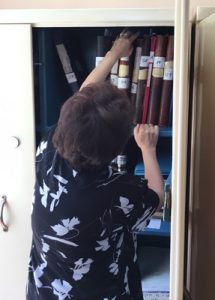 Several hours later after a few more red tape hoops to jump through, which included me having to purchase a special government payment stamp from a nearby post-office (a side excursion that could warrant its own blog post), we were ready to get our hands dirty and dig. An hour or so later I left that records office having seen the actual birth logbook entry from 1914 when my grandfather’s birth was recorded over one hundred years ago. I sat on a nearby bench overlooking the town and took a deep breath, acknowledging that I’d had a pretty special moment. Somehow walking on streets and sidewalks in the town my grandfather walked on as a child and sleuthing out this record felt like life was coming full circle in a way. Somehow those pen marks on that old, weathered, faded yellow paper made me feel like I belonged to a deep history of people, a verification of sorts, and my curiosity wants to know how far back that trail goes. Will it venture into France? Austria? Stay in the same region of Croatia? I was dying to know, and my journey tomorrow will hopefully bear more discoveries.
Several hours later after a few more red tape hoops to jump through, which included me having to purchase a special government payment stamp from a nearby post-office (a side excursion that could warrant its own blog post), we were ready to get our hands dirty and dig. An hour or so later I left that records office having seen the actual birth logbook entry from 1914 when my grandfather’s birth was recorded over one hundred years ago. I sat on a nearby bench overlooking the town and took a deep breath, acknowledging that I’d had a pretty special moment. Somehow walking on streets and sidewalks in the town my grandfather walked on as a child and sleuthing out this record felt like life was coming full circle in a way. Somehow those pen marks on that old, weathered, faded yellow paper made me feel like I belonged to a deep history of people, a verification of sorts, and my curiosity wants to know how far back that trail goes. Will it venture into France? Austria? Stay in the same region of Croatia? I was dying to know, and my journey tomorrow will hopefully bear more discoveries.
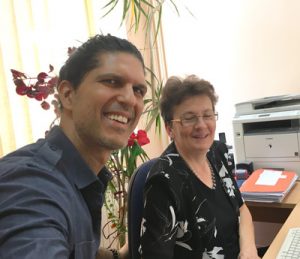 I was also excited to learn that my great grandmother was a school headmaster and her husband, my great grandfather, a teacher. An interesting dynamic for a couple in late 1800s Eastern Europe! It’s no wonder their son, my grandfather, was so well educated with multiple degrees, spoke ten languages, and was well read way beyond his class level. Is my never-ending, unquenchable pursuit of knowledge, the drive within that led to my love for school and acquisition of two master’s degrees, an energetic or genetic result of their union? As the mystery unfolds with each kernel of information uncovered, I am riveted and can’t wait to find out more, not only for myself, but for my whole extended family, my offspring, and generations to come.
I was also excited to learn that my great grandmother was a school headmaster and her husband, my great grandfather, a teacher. An interesting dynamic for a couple in late 1800s Eastern Europe! It’s no wonder their son, my grandfather, was so well educated with multiple degrees, spoke ten languages, and was well read way beyond his class level. Is my never-ending, unquenchable pursuit of knowledge, the drive within that led to my love for school and acquisition of two master’s degrees, an energetic or genetic result of their union? As the mystery unfolds with each kernel of information uncovered, I am riveted and can’t wait to find out more, not only for myself, but for my whole extended family, my offspring, and generations to come.
The fact that this is only 50% of what makes up my genetic code is mind boggling to me. There’s a whole other world of my heritage that I haven’t even begun to look into yet. Why is it that in the US, the world’s melting pot, we don’t have as tight of a grasp on our family histories as they do elsewhere in the world? The idea of knowing your genealogical history is a much more ingrained part of the cultures in other countries across the globe, but in the US, a relatively young country made up entirely of immigrants (unless you are of Native American descent), the line is often harder to trace. Of course there are exceptions of those that can trace back to their ancestors who arrived on the Mayflower, and those that can go even further, but for the most part, people can only go back a few generations, perhaps well into the 1800s. But it is not uncommon for the family trees of non-North American inhabitants to go back several centuries. How does this affect our culture here vs. there? Does the US adoption rate (both domestic and international) add to the faded records of our collective past? Thoughts to ponder as my research continues.
Identity
The Oxford English Dictionary defines Identity as: The fact of being who or what a person or thing is
The very definition of the word invokes a subconscious feeling of innate stability and groundedness, without which beseeches a yearning to know and find “what a person..is” by tracing familial roots or other means, perhaps through spiritual, practical, vocational, etc. For me, the further back I am able to trace my roots, the more deeply connected I feel towards who I am and where I come from, with the hopes of gaining insight on where I want to be or confirmation on where I am. As humans, we are interconnected energetically, physically, and genetically, whether we want to be or not. We are an accumulation of energetic combinations over the course of time, and to be completely blind or ignorant of that history is leaving a large piece of the “identity” puzzle out of the equation for yourself and subsequent generations. By seeking out my heritage, discovering the history, and solving the mysteries of who I am, I intend to tap into that connected energy through revelation, discovery, and always learning with humility and openness.
The Search Continues
Seek whatever ye shall find, find whatever ye shall be, and be whatever ye shall become.
Am I shackled by the idea of knowing my pedigree? Absolutely not, of course I’m confident in who I am and the life I have and would surely survive without knowing more. But will the fruits of this journey hopefully add to the understanding of my life and those of my relatives? I certainly hope so. And I also acknowledge that this quest is probably connected to a means of mourning the loss of my mother, as well as my grandparents, at a relatively younger age than most people. It’s been 6 years since she’s been gone, and I feel like researching these roots, something both she and her father always wanted to do but never did, is somehow bringing me closer to them, an homage to their, and my own, pursuit of identity. I could get into the history of Croatia, the communist regime of Yugoslavia, my mother and her family being displaced during WWII and marring their sense of identity while they desperately searched the world for a place to set new roots, but I will save some of that for the part 2 of this post.
I wait with baited breath for what secrets and mysteries the Croatian Archives in Varaždin have in store for me. Will light be shed onto my own enigmas? Or will it lead me to yet another step of discovery? Or will it be the dead end of the quest? The truths lie within, and only 50 km, a language barrier, mountains of red tape, and tenacity will come into play in determining success or failure.

